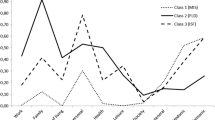Abstract
The aim of this research was to examine levels of happiness among persons with and without physical disability, and to study prediction of happiness from satisfaction with various life aspects. A group of persons with physical disability (N = 397) and the control group of persons from the general population (N = 913) filled in the Fordyce instrument (Social Indicators Research, 20:355–381, 1988) to evaluate levels of happiness and the “International Well-being Index” to measure satisfaction with particular life aspects. Both groups expressed positive happiness level and satisfaction with the majority of life aspects. However, happiness level of persons with disability was significantly lower. Forty-eight percent of the variance in happiness among persons with disability and 30% of the variance in happiness among the control group can be assigned to various life satisfaction aspects. Satisfaction with health, relationships, and achievements contribute to happiness in both groups, while satisfaction with physical safety and acceptance by the community are significant happiness predictors only for persons with disability. Economic status is the only significant predictor for the control group.

Similar content being viewed by others
References
Albrecht, G. L., & Devlieger, P. J. (1999). The disability paradox: high quality of life against all odds. Social Science & Medicine, 48, 977–988. doi:10.1016/S0277-9536(98)00411-0.
Allman, A. (1990). Subjective well-being of people with disabilities: Measurement issues. Unpublished Master’s thesis, University of Illinois.
Andrews, F., & Withey, S. R. (1976). Social indicators of wellbeing. New York: Plenum.
Argyle, M. (2000). Psychology and religion. London: Routledge.
Argyle, M. (2001). The psychology of happiness (2nd ed.). London: Routledge.
Bradburn, N. M. (1969). The structure of psychological well-being. Chicago: Aldine.
Bradburn, N. M., & Caplovitz, D. (1965). Reports on happiness. Chicago: Aldine.
Brickman, P., Coates, D., & Janoff-Bulman, R. (1978). Lottery winners and accident victims: is happiness relative? Journal of Personality and Social Psychology, 36, 917–927. doi:10.1037/0022-3514.36.8.917.
Cameron, P. (1974). Social stereotypes: three faces of happiness. Psychology Today, 8, 63–64.
Diener, E. (2000). Subjective well-being: the science of happiness and a proposal for a national index. The American Psychologist, 55, 34–43. doi:10.1037/0003-066X.55.1.34.
Diener, E., & Lucas, S. (1999). Personality and subjective well-being. In E. Diener, & N. Schwartz (Eds.), Well being: The foundations of hedonic psychology (pp. 213–229). New York: Russell Sage Foundation.
Diener, E., & Seligman, M. (2002). Very happy people. Psychological Science, 13, 81–84. doi:10.1111/1467-9280.00415.
Diener, E., & Such, E. (1997). Age and subjective well-being: an international analysis. Annual Review of Gerontology & Geriatrics, 17, 304–324.
Fordyce, M. (1988). A review of results on the happiness measures: a 60-second index of happiness and mental health. Social Indicators Research, 20, 355–381. doi:10.1007/BF00302333.
Freedman, J. (1978). Happy people. New York: Harcourt Brace Jovanovich.
Harker, L., & Keltner, D. (2001). Expressions of positive emotion in women’s college yearbook pictures and their relationship to personality and life outcomes across adulthood. Journal of Personality and Social Psychology, 80, 112–124. doi:10.1037/0022-3514.80.1.112.
Herzog, A. R., & Rodgers, W. L. (1981). Age and satisfaction: data from several large surveys. Research on Aging, 3, 142–165. doi:10.1177/016402758132002.
Hotard, S. R., McFatter, R. M., McWhirter, R. M., & Stegall, M. E. (1989). Interactive effects of extroversion, neuroticism, and social relationships on subjective well-being. Journal of Personality and Social Psychology, 57, 321–331. doi:10.1037/0022-3514.57.2.321.
Kaliterna-Lipovcan, L., & Prizmic-Larsen, Z. (2006). What makes Croats happy? Predictors of happiness in representative sample. In A. D. Fave (Ed.), Dimensions of well-being. Research and intervention (pp. 53–59). Milano: Franco Angeli.
Larson, R. (1978). Thirty years of research on the subjective well-being of older Americans. Journal of Gerontology, 33, 109–125.
Lichtenstein, P., Gatz, M., Pedersen, N. L., Berg, S., & McClearn, G. E. (1996). A co-twin control study of response to widowhood. Journal of Gerontology, 51, 279–289.
Lucas, R. E. (2007). Adaptation and the set-point model of subjective well-being: does happiness change after major life events? Current Directions in Psychological Science, 16, 75–79. doi:10.1111/j.1467-8721.2007.00479.x. Association for Psychological Science.
Lykken, D. (1999). Happiness: The nature and nature of joy and contentment. New York: St Martin’s Press.
Mehnert, T., Krauss, H. H., Nadler, R., & Boyd, M. (1990). Correlates of life satisfaction in those with disabling conditions. Rehabilitation Psychology, 35, 3–17.
Myers, D. (2000). The funds, friends and faith of happy people. The American Psychologist, 55, 56–67. doi:10.1037/0003-066X.55.1.56.
Myers, D. G., & Diener, E. (1996). The pursuit of happiness: new research uncovers some anti-intuitive insights into how many people are happy—and why. Scientific American, 274(5), 70–72.
Schilling, O. (2006). Development of life satisfaction in old age: another view on the “paradox”. Social Indicators Research, 75, 241–271. doi:10.1007/s11205-004-5297-2.
Seligman, M. (2002). Authentic happiness: Using the new positive psychology to realise your potential for lasting fulfilment. New York: Free Press.
Silver, R. L. (1980). Coping with an undesirable life event: A study of early reactions to physical disability. Evanston: Unpublished doctorate dissertation, Northwestern University.
Smith, J., Fleeson, W., Geiselmann, B., Settersten, R. A., & Kunzmann, U. (1999). Sources of well-being in very old age. In P. B. Baltes, & K. U. Mayer (Eds.), The Berlin aging study: Aging from 70 to 100 (pp. 450–471). New York: Cambridge University Press.
Tellegen, A., Lykken, D., Bouchard, T. J., Wilcox, K. J., Segal, N., & Rich, S. (1988). Personality similarity in twins reared apart and together. Journal of Personality and Social Psychology, 54, 1031–1039. doi:10.1037/0022-3514.54.6.1031.
Weinberg, N. (1988). Another perspective: Attitudes of people with disabilities. In H. E. Yuker (Ed.), Attitudes toward persons with disabilities (pp. 141–153). New York: Springer.
Wessman, A. E., & Ricks, D. F. (1966). Mood and personality. New York: Holt, Rinehart, & Winston.
White, A. (2007). A global projection of subjective well-being: a challenge to positive psychology? Psychtalk, 56, 17–20.
Acknowledgement
This research was conducted as a part of two projects “Development of National Indicators of Quality of Life” and “Religious pluralism, postmodern religious movements and Croatian identity” funded by grants from the Ministry of Science, Education and Sport of the Republic of Croatia.
Author information
Authors and Affiliations
Corresponding author
Rights and permissions
About this article
Cite this article
Marinić, M., Brkljačić, T. Love Over Gold—The Correlation of Happiness Level with Some Life Satisfaction Factors Between Persons with and Without Physical Disability. J Dev Phys Disabil 20, 527–540 (2008). https://doi.org/10.1007/s10882-008-9115-7
Received:
Accepted:
Published:
Issue Date:
DOI: https://doi.org/10.1007/s10882-008-9115-7




